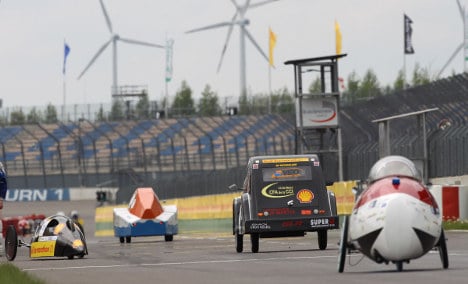Having spent hundreds of hours developing, building and tinkering with their vehicles, 213 teams from across the continent were visibly pumped to get them on a track at the 26th annual Shell Eco-marathon Europe on May 6 and 7.
While the event may have taken place at the EuroSpeedway Lausitz, a facility that hosts some high-octane car races, the participants were no ordinary gasoline junkies.
“Just say it out loud – they’re nerds,” said 25-year-old Swede Kristian Ericsson, project manager for Luleå University of Technology’s team. “But they are the nerds who become successful by doing this nerdy stuff.”
The “nerdy stuff” in this case was building cars that would travel the furthest distance on the least amount of conventional or alternative fuel in two categories – the futuristic “prototype” or the more conventional “urban concept.” Many teams, such as Ericsson’s, chose to enter both.
Though the cars didn’t move much faster than a loping 40 kilometres per hour, the mood surrounding the marathon – a cavalcade of vehicles ranging from the prototype section’s futuristic pods to cute urban concept coupes – was still exciting.
CLICK HERE FOR A GALLERY OF THE CARS AND TEAMS.
Amid the deafening chorus of revving engines, Ericsson and his team huddled in a tool-strewn paddock watching their urban concept vehicle, the Baldos II, navigate the track via a laptop GPS program.
This year it earned a respectable 16th place in the category, but the vehicle was a sensation at the event for another reason – this January in Sweden it became the first Eco-marathon vehicle ever to be classified as street legal. The accomplishment, along with those of other teams, is something that makes the event’s technical director Norman Koch proud.
“It is a reality that these are the engineers of the future,” he told The Local. “As a petroleum company it is not our domain to develop cars, which is why it is particularly credible if we run this educational platform and then step back and say to the students, ‘the technology is yours, the intellectual property is yours.’ ”
The event began in France 26 years ago, and the French teams remain among the strongest performers, but organisers decided to take it outside the country a few years ago to encourage other European institutions to incorporate the programme into their engineering curricula. With the addition of the Americas event in 2007 and the first Shell Eco-marathon Asia planned for later this year, the project has become truly global, Koch said.
And increasing the competition between teams means that the students are achieving greater feats. The biggest winners at this event were France’s Polytech Nantes engineering university, which broke a five-year record by more than 1,000 kilometres by travelling the equivalent of 4,896.1 kilometres on just one litre of fuel with their prototype. According to event organisers, this distance is roughly equal to driving Europe top to bottom, from the North Cape in Norway down to the toe of the Italian peninsula.
“It’s a good opportunity for the students to use their theories, it’s no longer just a dry run in the classroom,” University of Applied Sciences Offenburg professor Ulrich Hochberg told The Local.
Standing at the starting line ahead of the e-mobility demonstration run, an out of competition showcase for vehicles that incorporated electricity into their systems, the engineer beamed.
“It’s the most beautiful car,” he said of the sleek silver Urban Concept vehicle developed by his young team, urging the driver to flash its LED headlights playfully.
This year the group was the top-scoring German team, clocking 2794.9 kilometres per litre to win third place with their other vehicle, a prototype ironically named “Schluckspecht.”
“That’s German for someone who drinks too much,” Ulrich explained.
Having participated in the Eco-marathon with students for 12 years, Hochberg said he sees a new momentum for developing sustainably powered vehicles within the German car industry.
“In the press they are blamed for not being active in e-mobility, but in truth up until now it wasn’t possible to make any money doing it,” he said. “But now they are working on it and trying to spread the concept.”
And according to participants, the automotive industry is taking notice of their work. Both the Baldos II and the Schluckspecht team said they have been approached by industry professionals in their countries about developing the new technology.
One of Ulrich’s protégés, 26-year-old mechanical engineering graduate student Joerg Lienhard, said he plans to take his experiences from building the Schluckspecht to work in the industry.
“The time of combustion engines is over,” he told The Local. “And I think we can and should drive sustainable cars for a better environment in the future.”


 Please whitelist us to continue reading.
Please whitelist us to continue reading.
Member comments